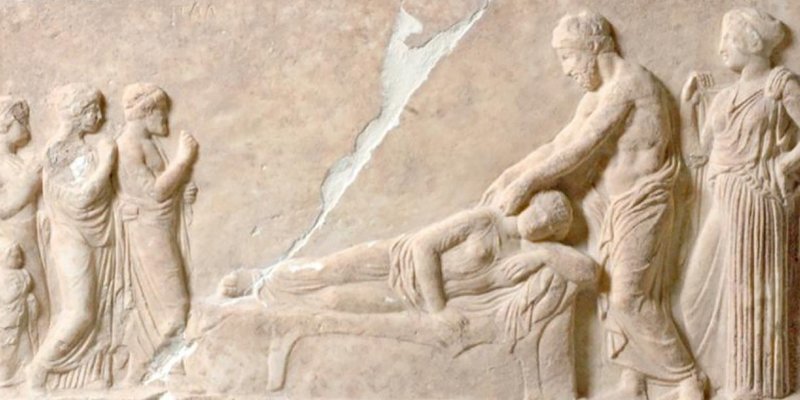Various elements that have been seen from time to time - language expressions, archaeological finds - reinforce the theory of the relation of Yoga to ancient Greek culture. Without subverting the error of the 'Greek-centered' reading of things in general, we will attempt to quote some data that do not exclude the existence of this relationship.
So what do those, who are involved in the emergence of this relationship, say?

The language association
Originally it is estimated that the word 'yoga' is related to the word 'zygos', which means yoke. In particular, the word yoga comes from the Sanskrit word jugam, which is interpreted as a ox yoke.
In Greek, the conversion of the letter δ (th) into ζ (z) (eg Δίας Thias - Zeus) is found. The word zygos, therefore, before it was transformed, was pronounced a thygon (δυγόν), which is as follows: number two + verb, that is, what is driven by two (δύο - thio).
So there is a common interpretation of the words, which concerns the agricultural machinery that is driven by two beasts of burden. In fact, the "affinity" of the word is found in yet another eleven languages, where their semantic and sonic coincidence impresses. Typically, the Latin yoke corresponds to the word iugum, to the Persian yugh, to the English yoke, to the Slavic igo, and to the Arabic (pronounced) zawj means a pair.
What is the etymology of 'zygos' and 'yoga' in the sense of yoga as we know it?
In essence, the meaning of the yoke is used as it symbolizes the relationship of soul and body and the balance between them. Yoga, playing the role of the shaft, ensures the balanced evolution of the body and soul.
Furthermore, the relationship and dynamics developed by the psychosomatic coupling through yoga leads to a culture of both. With this technique even the latent forces of man and the seeds are connected. With their proper cultivation, these 'seeds' can multiply their size and bear fruit.
Put it simply, the concept of the parallel work of the two sub-bodies (body and spirit), which draw in the same direction through the yoke (the psychosomatic method), under the guidance of the farmer (mind), concentrate the fruit of cultivation acquired by this combination (mental and physical balance).

Yoga is further characterized by the depth of analysis and teaching of the mental world and human physiology. The implementation and dissemination of this high level of analysis should be sought in a society with high intellectual development of a large part of the people. One such society that could frame, develop and apply the knowledge of physiology and spirituality of man is appreciated - in combination with the above references - that it was ancient Greek.
source: hellinon.net
Αγγελική Κοσκερίδου
Holistic Doctor – Counseling Psychotherapist
Doctor of Naturopathic Medicine
MSc c. Health Psychology